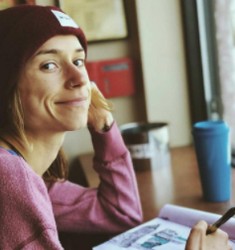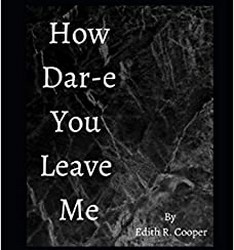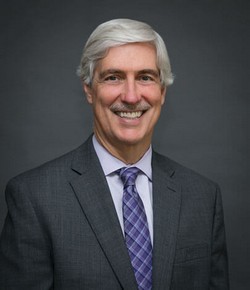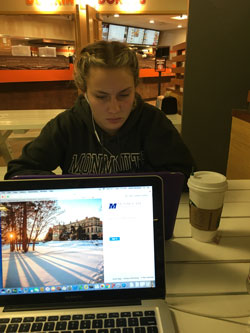Rebecca Ley’s story starts with running. Having grown up in Rumson and currently residing in Spring Lake, NJ, it’s the reason she decided to attend Monmouth. She ran distance on the women’s cross country team, won a school record in 2018, and aimed for the spring outdoor record for the 5K—until her life took an unexpected turn.
After a sudden digestive issue prevented her from running, she and her mother took a trip to the hospital, only to be sent home frustrated with inconclusive tests results.
“Mom, I’m not dealing with this,” she told her mother, “no one knows what’s wrong with me. I’m taking a walk and I’m going home.”
Afterwards, her mother responded, “Becca, I’m going to stay. I’m not feeling well.”
After three nights in the hospital, Ley decided to visit her mother. “I went there for me, and she ended up staying there for her. She was in one of the waiting rooms with my sister and my dad, and she didn’t look well,” Ley described. “And she said, ‘Becca, they found cancer.”
“I knew something like that was coming,” she continued. “I felt defeated.”
It was around this time that Ley quit running, a drastic change in her life that she had been thinking about for a while. “I didn’t know who I was without [my mom],” said the health studies student. “When I was younger, I was a gymnast and a surfer. I always had something going for me that I was going to excel at because I had my best friend at my side cheering me on. Seeing her get weaker and weaker all the time, I was like, ‘how do I go on without my biggest cheerleader?’”
Eight months after her mother was diagnosed with pancreatic cancer, she passed away in February 2019.
“I felt like I had no one,” Ley said. “I just had a lot of rage in me because after a death, at first everyone’s there, and then after a while they trickle off because they have their own lives and their own families.”
After seeing a therapist and a nutritionist, the 23-year-old turned to one other outlet—poetry. “When I quit running, I started going on long walks, and I started writing while I was walking. I’m not someone who can sit down and write,” she explained, as she was briskly walking through the halls of an independent living center, where she works as a caregiver for a woman with dementia. “I would come home and read to [my mom] what I wrote on the long walks, and she really liked them.”
Ley compiled the poems into a 122-page book, titled How Dar-e You Leave Me—a nod to her mother’s first name Daryl—that recounts the feelings of anger, grief, and isolation following her mother’s passing. Self-published under the pseudonym Edith R. Cooper, comprised of her middle name and her mother’s maiden name, the book also features original photographs that correspond with the raw, unapologetic emotion found in each poem.
“I almost gave up a million times because after I read [the poems], I was like, ‘they’re not perfect.’ I thought maybe I’ll just have them as a memory, but then it’s sad that they’re just sitting there collecting dust. None of the poems are edited; they’re all things I’ve written on walks. I just wanted to get myself out there as I am, flaws and all.”
She continued, “I want to move on from [the poems], but they keep telling me that they’re going to help someone else, whoever’s in this place. I don’t want to be shameful about the hurt that I went through anymore. I just went through so much anger and it helps me to share more than to hold it in. This book is kind of my little pity party…Maybe someone out there will click with it.”
Not only does Ley hope that readers will connect to her poetry, but with her infectious, ebullient personality, she immediately touches the lives of those she meets.
“She was my first friend at Monmouth and I’m really lucky that I met her,” said Chloe Barone, a ’20 alumna who met Ley at freshman orientation the summer before college. “She really changed my life in a lot of ways because she’s really kind and down to earth. I think it’s very rare when you meet someone and you could feel their energy and if they have a good soul. And she’s just a really good person down to the core.”
“Her mom was so lovely. She was an angel on the earth,” Barone continued. “[Ley] has been through a lot. She’s taken all these experiences—the good and the bad—and she reflects it perfectly through her poetry.”
Now, during the COVID-19 pandemic, Ley has once again turned to poetry to heal at a time when that familiar feeling of isolation began to resurface.
“During the quarantine, my mental health was failing,” she said. “I didn’t have my mother to talk to. I broke my foot at the beach. And you know walking is my biggest escape. That’s how I deal with everything.”
However, Ley kept in mind what her mother’s passing taught her—to stay resilient, no matter what happens.
Although her poetry book is available for purchase on Amazon, Ley is seeking creative minds skilled in media design and editing to help refine the book. “I know there’s so much potential at Monmouth to collaborate with someone,” she said.
Ley will be donating about 50-75 percent of book profits to pancreatic cancer research.
“[Her poetry] is really brave because I think that a lot of people don’t like to talk about the way they feel,” said Barone. “They feel uncomfortable or like they shouldn’t bring it up, because sometimes it’s scary if it gets really intense. But she does it really well.”
Moving forward, although Ley is still searching for the direction to take her health studies degree after graduating this May, she is sure of one thing—she will still be writing poetry on her walks, taking life one step at a time.
PHOTOS COURTESY of Rebecca Ley




